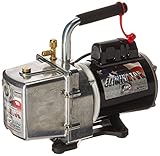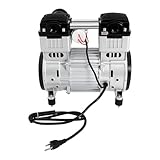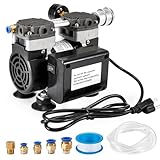Looking for the best industrial vacuum pumps for your business needs can be quite challenging, but worry no more as we have compiled a list of the top 10 best industrial vacuum pumps to help you make the right choice. Whether you’re in the manufacturing or healthcare industry, industrial vacuum pumps are essential to maintain a clean and safe environment. From high-end models to budget-friendly options, this buying guide has got you covered with everything you need to know about the best industrial vacuum pumps available on the market.
Before we get to our review of the best industrial vacuum pumps, let’s browse through some relevant Amazon products:
Last update on 2026-01-28 / #Ad / Affiliate links / Images from Amazon Product Advertising API
The Best Industrial Vacuum Pumps
Everything you Need to Know About Industrial Vacuum Pumps
Industrial vacuum pumps are designed to create and maintain vacuums within a variety of industrial settings. These pumps are often used in applications such as packaging, material handling, printing, and vacuum forming, as they are able to safely and efficiently remove air and other gases, dust, and other particles from a closed system or workspace. Vacuum pumps operate using a variety of technologies, including rotary vane pumps, liquid ring pumps, and dry screw pumps among others, all of which offer specific benefits depending on the application at hand.
Industrial vacuum pumps are essential components in a range of industrial processes. They help to remove excess air and other gases from a system, allowing for more efficient operations and improved product quality. These pumps can also be used to remove dust and other contaminants from a workspace, improving safety and hygiene. With a wide variety of styles and technologies to choose from, these pumps are highly adaptable and can be easily customized to meet the unique needs of industrial operations in a broad range of industries.
Why Do You Need to Buy Industrial Vacuum Pumps?
There are various reasons why choosing an industrial vacuum pump can be advantageous for different industries. From increased efficiency and durability to reduced maintenance costs, these pumps can offer a range of benefits that make them more than just another piece of equipment. Let’s delve into some of the key advantages of industrial vacuum pumps.
Efficient removal of debris and contaminants
Industrial vacuum pumps are used in order to efficiently remove debris and contaminants from various spaces. Dust, dirt, and debris can accumulate in large amounts in industrial settings, which can be dangerous and can negatively impact the quality of products being produced. By using vacuum pumps, these contaminants can be effectively removed and disposed of properly.
Industrial vacuum pumps can also help with the removal of hazardous materials, such as chemicals or asbestos. These materials can be difficult to remove and dispose of safely without the use of specialized equipment. Vacuum pumps can help in this process, providing a safe and efficient way to remove hazardous materials from the work environment.
Overall, the use of industrial vacuum pumps can greatly improve the cleanliness and safety of the work environment, while also helping to maintain product quality and compliance with regulatory requirements.
Increased safety in work environments
Industrial Vacuum Pumps offer increased safety in work environments by reducing the risk of accidents caused by debris, dust, and other forms of hazardous materials. These pumps suck up these materials and remove them from the work area, denying them the chance to cause harm to workers and the environment.
In industries where hazardous materials are common, such as mining and construction, the use of Industrial Vacuum Pumps is necessary to comply with safety regulations and ensure the well-being of workers. Aside from safety, these pumps also enhance the overall cleanliness and efficiency of the work environment, promoting a healthier and more productive workspace.
Improved productivity and performance
Industrial vacuum pumps are crucial for maintaining the productivity and performance of many industrial applications. For example, in the manufacturing industry, vacuum pumps are used to create a vacuum environment for various processes like drying, impregnation, degassing, and coating. These processes are time-consuming and require a high level of accuracy and precision. However, with the right vacuum pump, these processes can be completed efficiently and with a high level of precision.
Moreover, vacuum pumps are also used in the packaging industry to keep food and other products fresher for longer. Vacuum packing can extend the shelf life of perishable goods by preventing the growth of bacteria and other microbes that cause spoilage. This reduces the risk of product recalls, which can have a significant impact on the company’s reputation and bottom line. Therefore, by investing in industrial vacuum pumps, companies can improve their productivity and performance, which ultimately leads to increased profitability.
Reduced maintenance costs and downtime
Industrial vacuum pumps are essential equipment for many industrial processes such as chemical processing, oil refining, food production, and pharmaceutical manufacturing. One of the main benefits of using industrial vacuum pumps is reduced maintenance costs and downtime. When industrial vacuum pumps are used, there is less wear and tear on the machines as they are built to handle heavy loads and long hours of operation. This means less frequent maintenance and repair costs. Additionally, industrial vacuum pumps were designed with easy maintenance and repair in mind, further reducing downtime and overall maintenance costs. By investing in industrial vacuum pumps, manufacturers can save money on repairs, maintenance, and downtime, which in turn helps to improve profits and sustain business growth.
A Comprehensive Guide to Choose the Best Industrial Vacuum Pumps
Before investing in an industrial vacuum pump, there are several important elements to take into consideration to ensure that you get the most effective and efficient equipment for your specific applications.
Flow rate
Flow rate is an important consideration while buying an industrial vacuum pump because it determines the amount of air or gas that can be moved by the pump. The flow rate of a vacuum pump is usually measured in cubic feet per minute (CFM) or liters per minute (LPM). A higher flow rate ensures faster evacuation of the vacuum chamber and quick removal of debris or contaminants. Therefore, a vacuum pump with a higher flow rate will be more effective in applications where there is a need to quickly clean a large volume of air or gas.
The flow rate also affects the overall performance and efficiency of the vacuum pump. A vacuum pump with a low flow rate will have to work harder to move the same amount of air or gas as compared to a high flow rate pump. This can result in higher energy consumption and increased wear and tear on the pump. Therefore, it is important to consider the required flow rate for a specific application while selecting an industrial vacuum pump to ensure optimal performance and efficiency.
Power consumption
Power consumption is an important factor to consider before buying industrial vacuum pumps as it directly impacts the operational cost of the equipment. High power consumption increases the energy bills and lowers the profits of industrial operations. Therefore, it is essential to choose a vacuum pump that has low power consumption but high vacuum pump performance. A vacuum pump with a high vacuum performance can maintain suction at low power, reducing energy usage.
Moreover, power consumption can also affect the lifespan and maintenance of industrial vacuum pumps. High power consumption generates more heat and increases the wear and tear of the machinery, leading to frequent maintenance and reduced lifespan. Therefore, it is vital to choose a vacuum pump with efficient motors that consume less power, generating less heat and reducing wear and tear. This will lead to a longer lifespan and lower maintenance costs, saving money in the long run. Hence, it is wise to consider power consumption before buying industrial vacuum pumps to make an informed decision.
Vacuum level
The vacuum level is a critical factor to consider before purchasing an industrial vacuum pump because it determines the maximum pressure difference that the pump can create between the inlet and outlet. Different applications require different vacuum levels, and choosing the wrong pump can result in inefficient performance, damage to the system, and increased energy consumption. For example, if a pump with a low vacuum level is used in a system that requires a higher level, it will not be able to remove all the air and gas from the system, leading to reduced product quality and increased maintenance costs.
In addition, the vacuum level also affects the total cost of ownership of the pump. Higher vacuum levels generally require more energy and maintenance, resulting in higher operating costs. Therefore, considering the appropriate vacuum level before purchasing an industrial vacuum pump can help ensure that the pump matches the application requirements, operates effectively and efficiently, and provides a satisfactory return on investment.
Maintenance requirements
Maintenance requirements are an important factor to consider when buying industrial vacuum pumps as they can significantly impact the pump’s lifespan and performance. A pump that requires frequent maintenance may result in downtime, increased costs, and decreased efficiency. On the other hand, a pump with low maintenance requirements typically results in reduced downtime and increased productivity, making it a more cost-effective investment over the long term.
Furthermore, considering maintenance requirements before purchasing can help you choose a vacuum pump that aligns with your organization’s operational needs and resources. For instance, if you lack the necessary skills and resources to maintain a specific pump, it may be better to opt for a pump that requires less maintenance or has a service team available. Overall, understanding the maintenance requirements of a vacuum pump will ensure that you make an informed purchasing decision and maximize the benefits of your investment.
Noise level
The noise level is an essential consideration when buying any industrial equipment, including vacuum pumps. A high level of noise pollution can cause hearing damage, increase stress levels, and contribute to productivity loss for workers in the immediate vicinity. Additionally, noise pollution can violate local regulations, leading to potential fines or shutdowns. Therefore, it is crucial to ensure that the vacuum pump’s noise level is within acceptable limits and meets any applicable regulatory requirements.
Moreover, a quieter vacuum pump can also improve the overall working environment and reduce the need for additional soundproofing or other noise reduction measures. This can result in a more comfortable and safer workplace for employees, leading to improved morale and productivity. Therefore, buyers should consider the noise level when purchasing industrial vacuum pumps to ensure a safe and comfortable environment for workers while adhering to regulatory requirements.
Price
Price is an important factor to consider when buying industrial vacuum pumps as they can be a significant investment for businesses. It is vital to determine the budget for the pump before purchasing to avoid overspending or purchasing a low-quality pump that may require frequent repairs, leading to additional costs. Additionally, buyers should compare prices from different manufacturers and suppliers to get the best possible deal without compromising on quality and performance.
While it may be tempting to choose a cheaper pump to save costs, it is crucial to consider the long-term costs associated with maintenance, repairs, and replacement. A high-quality pump may have a higher upfront cost, but it can provide better performance, reliability, and durability, resulting in fewer repairs and replacements over time. Thus, buyers should weigh their options carefully before selecting the best pump that provides quality performance within their budget.
Frequently Asked Questions
What are industrial vacuum pumps used for?
Industrial vacuum pumps are used in many applications across several industries. A vacuum pump is a machine that removes gas or air molecules from a sealed chamber, creating a vacuum or low-pressure environment. Industrial vacuum pumps are used to extract gas or air molecules in different applications such as vacuum sealing, impregnation, food packaging, distillation, freeze drying, and many others.
In the manufacturing industry, industrial vacuum pumps are used to extract air and moisture from the molds during the plastic injection molding process. They are also used in the semiconductor industry, where they create a vacuum inside the equipment to prevent contamination. In the pharmaceutical industry, vacuum pumps are used in various applications, such as solvent recovery, freeze-drying, and distillation. Additionally, industrial vacuum pumps are widely used in the oil and gas industry for offshore oil exploration.
How do industrial vacuum pumps work?
Industrial vacuum pumps work by creating a difference in air pressure between the inside and outside of the pump. This creates a suction force that draws air and any other substances that may be present into the pump. Once inside, the air or substances are compressed and pushed out the exhaust port of the pump or into a collection chamber.
There are several types of industrial vacuum pumps, including rotary vane, liquid ring, and dry screw pumps. Each type works in a slightly different way, but all use the principle of creating a pressure differential to create a vacuum. Industrial vacuum pumps are used in a wide range of applications, including in manufacturing, chemical processing, and transportation, among others.
What are the different types of industrial vacuum pumps available?
Industrial vacuum pumps are used in various industries to remove air and gases from equipment and systems. There are different types of industrial vacuum pumps available such as positive displacement pumps, momentum transfer pumps, entrapment pumps, and regenerative vacuum pumps.
Positive displacement pumps work by trapping gases in a confined space and then transporting them out of the system. These include rotary vane pumps, screw pumps, diaphragm pumps, and piston pumps. Momentum transfer pumps use high-speed blades or jets to remove gases from the system. Examples of these are turbo pumps, diffusion pumps, and ion pumps. Entrapment pumps trap or absorb gases through a chemical or physical reaction, including cryogenic pumps and ion getters. Regenerative vacuum pumps use a spinning impeller to create a vacuum, including claw pumps and liquid ring vacuum pumps. The choice of vacuum pump depends on the application and specific requirements of each industry.
Final Thoughts
After thorough research and analysis, we have presented the top 10 best industrial vacuum pumps that are currently available in the market. It is essential to choose the right vacuum pump for your industrial needs, and these pumps have been reviewed to provide a comprehensive guide for the buyers.
Choosing the best industrial vacuum pump can enhance the efficiency and performance of your industrial process. Keeping in mind the key factors such as flow rate, pressure, suction capacity, and power, you can make an informed decision to select the best industrial vacuum pump to suit your requirements. These top 10 best industrial vacuum pumps are the perfect blend of quality, performance, and durability, making them an excellent investment for your business.




